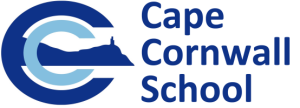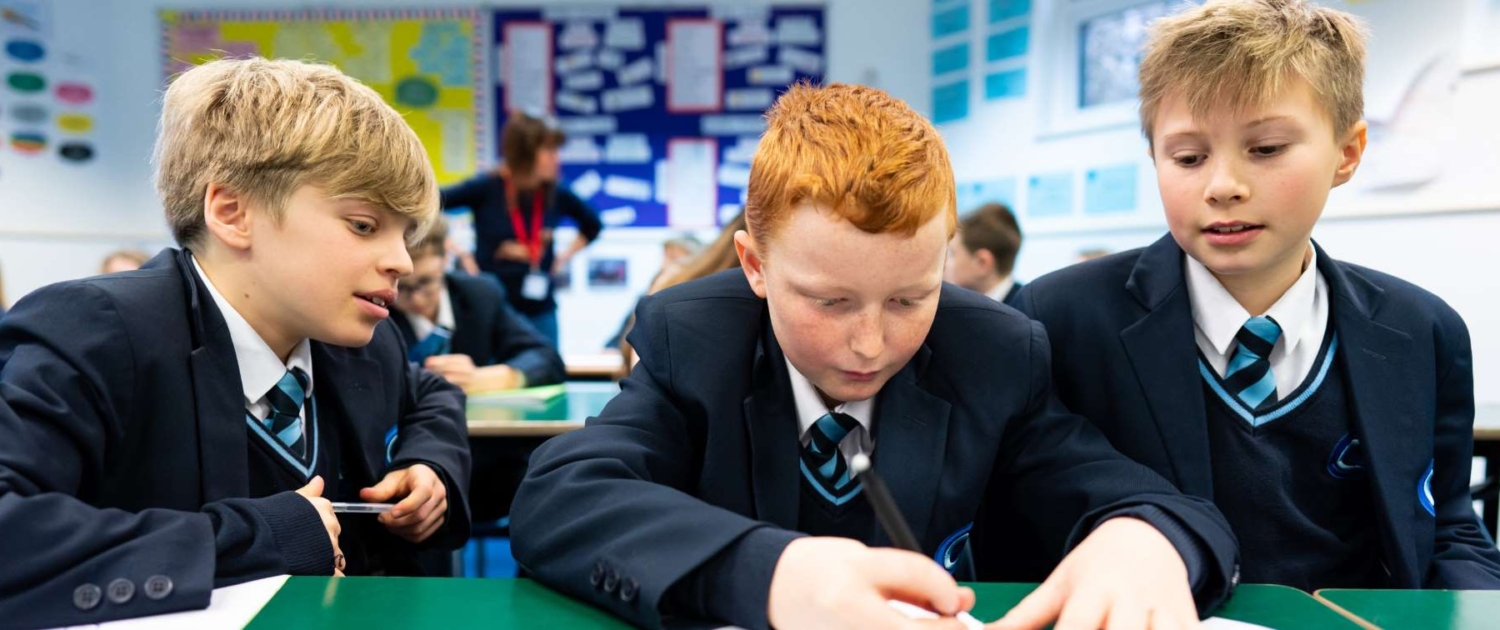Cape Cornwall School: Curriculum Statement
Section 1: Intent
“Tell me and I’ll forget; show me and I may remember; involve me and I’ll understand.”
(Chinese proverb)
Introduction
The Cape Cornwall School Curriculum ensures that all our students have the opportunity for academic and personal development across a broad range of subjects and experiences. It combines equality of opportunity to our core learning with opportunities for students to make individual choices regarding their learning experiences. Acquisition of knowledge and
transferrable skills are the cornerstones of our students’ progress and we place a high value on building their understanding of community, place and social justice. Lessons and other learning experiences are sequenced to build on students’ prior knowledge, and to ensure that students deepen their understanding of each subject, and the interconnection between subjects and their global context.
- Our Curriculum is the foundation to achieving our Core Principles:
Students leave Cape Cornwall School with high value achievements and the life skills and resilience that provide a platform for future success and happiness. - We are inspired to work together to research, design and implement highly effective and sustainable solutions to develop and maintain our thriving school community.
- Continuous improvement is achieved through a whole school culture of, and commitment to, creativity, engagement and professionalism.
Curriculum Foundations
Breadth of Learning
Our Curriculum gives all our students the opportunity to participate in an extensive range of learning experiences which include a rich variety of subjects and personalised learning opportunities.
- Students study a broad range of subjects within their curriculum: English, maths, science, computer science, French, geography, history, music, drama, art, design technology, PSHE, RE and PE. Achievements in all aspects of the curriculum are highly valued.
- A wide variety of extra-curricular activities – including our ‘Be Inspired’ programme and trips – offer students the opportunity to extend and deepen their knowledge and skills, and to share in new and different experiences which help shape their understanding and perspective.
- The Duke of Edinburgh Award Scheme, and other outdoor learning programmes are offered to all our students with specific programmes to encourage less socially confident students to participate and succeed.
Supporting Literacy
- ‘Accelerated Reader’ provides all students in Years 7 to 9 with daily dedicated time to read. Careful assessment of students’ reading level ensures that they are signposted to literature which challenges and extends their vocabulary.
Pastoral Programme
- All our students participate in a daily tutor programme which develops social skills, awareness of local, national and international issues and team identity. This enables our students to develop their understanding of active citizenship and community, and to appreciate and value their own contribution to this, and that of others. Our tutors are key adults in every student’s school life: they provide academic and personal support and guidance and work with the pastoral
team to ensure that each child makes the most of the opportunities available to them.
Section 2: Implementation
“You can teach a student a lesson for a day; but if you can teach them to learn by
creating curiosity, they will continue the learning process as long as they live.”
Clay P. Bedford
Students’ development of knowledge and skills is scaffolded by the careful sequencing of lessons within and between subjects to link topics, build on prior learning and to provide contextualisation and relevance. Students are supported to develop a clear understanding of what and why they are learning, how topics and concepts link and when or why they might need to use them for life skills or future academic application.
Our Curriculum, combined with our Teaching and Learning approaches, challenge our students to achieve their best and to encourage them to work outside of their comfort zone. Our curriculum is responsive to student need and is continually reviewed to ensure it continues to build on prior learning, and to provide a platform for success post-16. Our Curriculum is designed to regularly and frequently revisit topics, and to make explicit links to previus learning. Lessons are planned to enable students to master ‘Repeat Concepts’ through recall, retrieval and the re-activation of prior learning. This leads to development of deeper, sustained understanding and the ability to communicate learning. Our students are challenged to look and think beyond the immediate topic of the lesson: they have opportunities to apply their learning to different contexts and situations without fear of failure and as a result. As a result, they are confident and keen to learn.
Curriculum Structure
Key Stage 3 (Years 7-9)
Students follow a broad course of study from Year 7 to Year 9 to help them gain cultural capital and wide-ranging background knowledge that will set our young people up well for the next phase of their lives and beyond. We believe that a three year Key Stage 3 is the best way to build knowledge in preparation for specialisation at GCSE and beyond. During the three year programme of study, students build their understanding of the key or ‘Repeat’ concepts that underpin all school subjects. Students select their GCSE options in Year 9, for study in Year 10.
Decision making is supported by a carefully planned option programme involving subject teachers, parents, tutors, post-16 providers and independent careers guidance. The curriculum from Years 7 to Year 9 is designed to build skills, fluency and knowledge needed for success in the next stage of learning.
Key Stage 4 (Years 9, 10 and 11)
The majority of our students will take between 9 and 10 GCSE qualifications as well as continuing their PE, PSHE and RE studies. Students are encouraged to take the EBACC suite of qualifications as a foundation for accessing Further Education. Where students decide not to follow this path their entitlement to link their learning choices to their future pathways and talents is respected. In this way, student’s breadth of learning continues throughout their time at Cape Cornwall School and is further enhanced by our extra-curricular opportunities and the strong emphasis we place on learning beyond the classroom.
Initiating GCSE study in Year 10 means that our students are given the time to deepen and broaden learning within a focused time frame. These final two years allow students to specialise on their chosen subjects and prepare for terminal examinations.
Included within our GCSE programmes, are opportunities to learn beyond the GCSE specifications and to promote readiness for the next stage of education and employment, post-16.
Closing the Gap
A range of curriculum approaches are used to close the gap and ensure no student is left behind. Sequences of lessons are carefully planned to build the social, cultural and academic capital needed for students to access their learning and to develop their literacy. Teachers are adept at identifying potential misconceptions and use pre-teaching and a range of other teaching
strategies to remedy these. Subject specific vocabulary is explicitly taught in lessons and all teachers recognise the importance of Tier 2 and Tier 3 vocabulary in their lesson planning.
Progression in reading skills is scaffolded by effective use of ‘Accelerated Reader’ and subject specific opportunities to read non- fiction texts.
Timetable Structure
Our timetable is structured around four 75 minute lessons per day, on a fortnightly cycle (Weeks A and B). There is a daily tutorial session of 20 minutes each morning.
Key Stage 3: Year 7 & 8
Key Stage 3: Year 9
In addition, students in Years 7 to 9 have 30 minutes daily dedicated reading time within their lessons, five days a week (for the Accelerated Read programme).
Key Stage 4: Year 10
Key Stage 4: Year 11
Section 3: Impact
“Our Curriculum enables students to leave Cape Cornwall School with high value
achievements and the resilience and life skills that provide a platform for future
success and happiness.”
Cape Cornwall School Core Principles
We evaluate the impact of our curriculum using a range of strategies: these include formal external exams; more informal in-class assessments; review of students’ classwork; discussions with students about the material they are studying and student questionnaires. Middle Leaders regularly evaluate the impact of their curriculums and identify areas for further development.
Senior Leaders conduct regular ‘Subject Reviews’ which triangulate various sources of information to reach a judgement on the quality of education in that subject. At the end of the subject review, strengths and areas for development are shared with the subject leaders.
Using a range of information to determine impact ensures that our evaluation is robust and rigorous, and that actions as a result are based on a sound understanding of our curriculum strengths and areas for development.
Assessment strategies include the following:
- In-class discussion and feedback. Groups, peer to peer and teacher led discussions allow students to articulate their knowledge and strengths and be clear about their next steps in learning.
- Formative and summative testing, including frequent ‘low stakes testing’, allows students to demonstrate the progress made. In addition, these assessments provide a valuable opportunity to promote revision and memory skills and exam technique.
- Summative attainment and progress information from key assessment points including end of year, end of key-stage and GCSE exams inform future planning.
- Assessment and feedback – students have the opportunity to practice, improve and extend their learning through specific tasks which are assigned to individual students from their teacher’s marking of their work. All marking takes the form of ‘highlights, next steps and over to you’ (see Assessment and Feedback Policy for more details).
- We keep a barometer of the confidence, engagement and resilience of our students via regular learning walks and lesson observations provide valuable insights into student well-being, confidence and resilience.
- Behaviour is carefully monitored through lesson visits and scrutiny of achievement and behaviour points, to ensure that our students develop with a confident, positive view of themselves and others and that our expectations for cooperation and participation are achieved in every classroom.
- Parents are encouraged to actively engage with the school and to provide feedback about their child’s experiences. We place a high value on clear communication pathways to inform parents and carers about the development, progress and opportunities for their children and to listen to their views.
These varied processes allow us to understand how our students are progressing through the various stages of their education at Cape Cornwall School to ensure that all our students can achieve high value qualifications and the resilience and life skills that will provide a platform for future success and happiness.





